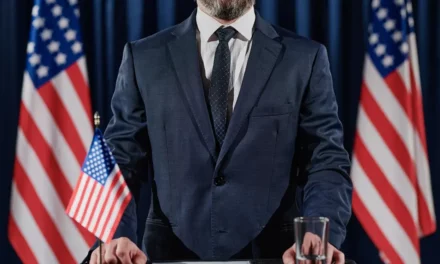In an era where political elite warhawks all too often overshadow citizens’ cries for peace, the Libertarian Party stands steadfast, championing non-interventionism and constitutional fidelity. Simply put, we are the only party that wants to End the Wars; and central to our ethos is the Defend the Guard legislation, a rallying point gathering momentum with an influx of 180 new volunteers for phone banking efforts.
The Libertarian perspective on war hinges on a fundamental respect for human life and the horrors that war inflicts on humanity. War, in the Libertarian view, is not just a political or strategic failure, but a profound moral catastrophe. The impact of war stretches far beyond the battlefield. Soldiers, often young men and women, are put in harm’s way, facing unimaginable horrors that can leave lasting psychological scars. The prevalence of post-traumatic stress disorder (PTSD) and other mental health issues among veterans is a testament to the enduring impact of war. War also drains economic resources, diverting funds that could be used for more constructive purposes, like education and infrastructure.
Furthermore, the Libertarian critique of war extends to the erosion of democratic principles. The U.S. Constitution explicitly grants Congress the power to declare war, a stipulation that has been increasingly overlooked in recent decades. This departure from constitutional norms represents not just a legal overstep, but a moral one, effectively silencing the voice of the people in matters of war and peace. The Defend the Guard movement, therefore, is not just about ending wars, but about restoring constitutional governance and the rule of law.
As global conflicts continue to escalate, notably the Ukraine-Russia war and the Israel-Gaza conflict, in addition to Biden’s end of year airstrikes in Iraq, it seems we are heading directly towards World War 3. The urgency for movements like Defend the Guard has never been more pronounced. The political landscape, marred by the rhetoric of war pigs like Nikki Haley and entwined with the political elites’ Military Industrial Complex interests (read: financial incentives), reveals a desperate need for a strong, peace-advocating voice.
Defend the Guard boldly opposes deploying state National Guard units into active combat without a formal war declaration from Congress. This movement upholds the Tenth Amendment, empowering states to reclaim their sovereign roles in national defense and ensuring the deployment of American soldiers only under constitutionally sound mandates. It’s tragic to say, but so many people don’t even realize war must be declared by Congress – because our warhawk leaders decided to ignore it many years ago.
In Montana, the journey of the Defend the Guard Act, spearheaded by Rep. Lee Deming, encapsulates the movement’s challenges and milestones. Despite a narrow victory in the House Committee, the bill faced defeat on the floor with a 40-60 vote, yet gained majority Republican support and several Democratic votes. Rep. Deming, reflecting on his experience, emphasized the bill’s alignment with the non-aggression principle and the shock of many upon learning about the extensive deployment of the National Guard.
Liam McCollum, a Region Representative for the Montana Libertarian Party, echoed Deming’s sentiments. He highlighted the challenges faced, particularly the opposition’s arguments around federal funding and the strong influence of the military-industrial complex. McCollum stressed the importance of focusing on the human element and moral reasons for the Defend the Guard Act.
Their collective experiences revealed a receptive public opinion, yet often hindered by fears of federal retribution. Both Deming and McCollum see the movement as a crucial step towards ending America’s endless wars and urge activists to engage with various groups, including veterans’ organizations and civil liberties advocates, to build support.
Amy Lepore, a committed Libertarian activist, said, “Witnessing the strength of state-led pushes to back Defend the Guard has been eye-opening.” Her work with groups like Bring Our Troops Home illustrates the widespread support for this initiative.
Angela McArdle, Chair of the Libertarian Party, stated, “Defend The Guard empowers states to reject unconstitutional wars. It symbolizes a creative stride in advancing non-interventionism and conveying our commitment to peaceful foreign policy.”
Zeb Proctor, another staunch advocate, shared, “I was drawn to Defend the Guard as it directly addresses our flawed foreign policy and honors our troops’ sacrifices.” Despite some skepticism within the Libertarian community, Proctor remains committed. “The positive public response in Tennessee has been encouraging, showing the movement’s appeal beyond the Libertarian Party,” he said.
Proctor sees Defend the Guard as a catalyst for broader policy shifts and party growth. “It not only aims to correct foreign policy but also to provide a blueprint for future Libertarian initiatives,” he said. His advice to fellow activists was clear: “Focus on Defend the Guard as a singular issue. Success here can pave the way for other policies and candidates.”
The potential success of Defend the Guard legislation represents a pivotal moment for the Libertarian Party, resonating with voters tired of the bipartisan perpetuation of unconstitutional wars. Lepore’s belief in the cascading effect of a single state’s victory underscores the transformative potential of this movement.
Defend the Guard transcends mere legislation; it is a call for constitutional adherence and a reevaluation of America’s foreign policy. It embodies the core values of Libertarianism, offering a tangible path to change, one state at a time.
The opinions shared here do not necessarily represent the official position of the Libertarian Party. These editorial articles have been submitted by Libertarians across the country, and featuring these topics does not represent an endorsement of the content therein.






Fascist Deep State World Mystery Secret Brotherhood Babylonian Saturn Negative Energy Code Druid's Greatest Secret Occult https://www.youtube.com/watch?v=KxTYwNADspM
Thanks for helping elect this right wing carpet bagger. Can’t wait!
I may have to change my affiliation with the lp after reading about an assassination post out of New Hampshire!…
Those are very valid points, and yet many people in this country can't undermine the republic and its foundations fast…
Agreed. The only alternatives I can see to BGB's ballot stuffing are open ballots (though the counters may just be…